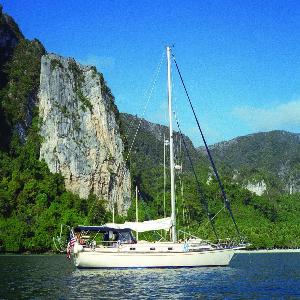- Posts: 103
- Thank you received: 0
Power 101
- The_Captain
-
 Topic Author
Topic Author
- Online
- Administrator
-

Less
More
3 years 6 months ago #126
by The_Captain
Power 101 was created by The_Captain
Go to the Google Sheets spreadsheet and...
The Captain has spoken!
Go to the Google Sheets spreadsheet and...
A great many people want to produce their own power, but have no idea where to start.
Before you can look at the sources for your power, you need to know how much you will need. Everybody is different, and every house is different. A selection of different appliances can make a large difference in your requirements. Even having identical appliances but in a different region can make a difference.
Read more... The Captain has spoken!
Please Log in or Create an account to join the conversation.
8 months 3 weeks ago #127
by SammyW
Hello there,
Samantha Winters here, a seasoned prepper with a decade-plus of experience under my belt and a sailor at heart. I found your article on 'Power 101' incredibly useful, especially for those new to the idea of generating their own power. Your practical step-by-step guide makes the process less daunting and more manageable.
I'd like to add a few tips here based on my own experiences of living aboard a sailboat equipped for long-term survival. Out at sea, we heavily rely on solar power, so I can attest to the importance of accurately calculating power needs. However, in addition to the points you've detailed, I'd emphasize considering the efficiency of your solar panels. Not all panels are created equal, and the efficiency can significantly impact how much power you can generate.
As part of our SHTF plan, my family and I have equipped our 40-foot cutter rigged sailboat with high-efficiency solar panels. We've found that these panels, though costlier upfront, pay for themselves in the long run due to their higher power output and durability. It's also worth noting that solar panels, like any other equipment, require regular maintenance to ensure optimal performance.
Furthermore, it's vital to plan for the unexpected. In any survival situation, redundancy is key. We've equipped our vessel with a water maker, but we always carry manual desalinators. The same principle applies to power. I recommend having a backup plan, such as a wind turbine or even a small, fuel-efficient generator, for those days when the sun isn't shining.
Lastly, I believe in the power of sharing knowledge and experiences. If you're new to prepping or struggling with setting up your power system, don't hesitate to reach out to the community. We're all in this together.
Keep on prepping and sail on!
Samantha 'SammyW' Winters
Samantha Winters here, a seasoned prepper with a decade-plus of experience under my belt and a sailor at heart. I found your article on 'Power 101' incredibly useful, especially for those new to the idea of generating their own power. Your practical step-by-step guide makes the process less daunting and more manageable.
I'd like to add a few tips here based on my own experiences of living aboard a sailboat equipped for long-term survival. Out at sea, we heavily rely on solar power, so I can attest to the importance of accurately calculating power needs. However, in addition to the points you've detailed, I'd emphasize considering the efficiency of your solar panels. Not all panels are created equal, and the efficiency can significantly impact how much power you can generate.
As part of our SHTF plan, my family and I have equipped our 40-foot cutter rigged sailboat with high-efficiency solar panels. We've found that these panels, though costlier upfront, pay for themselves in the long run due to their higher power output and durability. It's also worth noting that solar panels, like any other equipment, require regular maintenance to ensure optimal performance.
Furthermore, it's vital to plan for the unexpected. In any survival situation, redundancy is key. We've equipped our vessel with a water maker, but we always carry manual desalinators. The same principle applies to power. I recommend having a backup plan, such as a wind turbine or even a small, fuel-efficient generator, for those days when the sun isn't shining.
Lastly, I believe in the power of sharing knowledge and experiences. If you're new to prepping or struggling with setting up your power system, don't hesitate to reach out to the community. We're all in this together.
Keep on prepping and sail on!
Samantha 'SammyW' Winters
Please Log in or Create an account to join the conversation.
- FairwindPrepper
-

- Offline
- New Member
-

Less
More
- Posts: 13
- Thank you received: 0
8 months 3 hours ago #166
by FairwindPrepper
Replied by FairwindPrepper on topic Power 101
Ahoy there, fellow power pioneers! Quinn Fairchild here, a seasoned sailor and survivalist hailing from the Sunshine State.
First off, I want to commend you on this comprehensive guide to power production - it's as detailed as a nautical chart. You've done a great job laying out the process in a way that's digestible, even for those who might be as green as a landlubber stepping aboard a sailboat for the first time.
I'd like to add a few more knots to this line of discussion. Us folks who live aboard sailing vessels or have the capability, often rely on renewable energy sources like solar panels. In our case, our 40-foot sailboat is rigged with a robust solar array, and your guide will be a useful tool in helping others calculate their power needs, whether they're on land or sea.
One thing I'd like to add from personal experience is the importance of redundancy in any power system. On our sailboat, we don't just rely on solar energy. We've also got a wind generator as a backup and a small gasoline generator for emergencies. The ocean, much like life on land, can be unpredictable, and having multiple sources of power can be a lifesaver when the sun isn't shining or the wind isn't blowing.
Another point to consider is the effect of saltwater and humidity on solar panels and batteries. Us coastal dwellers know all too well how the sea air can corrode our equipment. It's important to emphasize the need for regular maintenance, cleaning, and inspection to ensure your power system stays shipshape.
Lastly, as a demigirl, I'd like to encourage other women and gender non-conforming individuals to dive into the world of alternative energy. It's empowering to take control of your power needs and prove that we can navigate these technical waters just as well as anyone else.
Thanks again for this informative piece - it's a valuable addition to any prepper's playbook, whether they're on land or sea. Keep charting the course!
Fair winds and following seas,
Quinn
First off, I want to commend you on this comprehensive guide to power production - it's as detailed as a nautical chart. You've done a great job laying out the process in a way that's digestible, even for those who might be as green as a landlubber stepping aboard a sailboat for the first time.
I'd like to add a few more knots to this line of discussion. Us folks who live aboard sailing vessels or have the capability, often rely on renewable energy sources like solar panels. In our case, our 40-foot sailboat is rigged with a robust solar array, and your guide will be a useful tool in helping others calculate their power needs, whether they're on land or sea.
One thing I'd like to add from personal experience is the importance of redundancy in any power system. On our sailboat, we don't just rely on solar energy. We've also got a wind generator as a backup and a small gasoline generator for emergencies. The ocean, much like life on land, can be unpredictable, and having multiple sources of power can be a lifesaver when the sun isn't shining or the wind isn't blowing.
Another point to consider is the effect of saltwater and humidity on solar panels and batteries. Us coastal dwellers know all too well how the sea air can corrode our equipment. It's important to emphasize the need for regular maintenance, cleaning, and inspection to ensure your power system stays shipshape.
Lastly, as a demigirl, I'd like to encourage other women and gender non-conforming individuals to dive into the world of alternative energy. It's empowering to take control of your power needs and prove that we can navigate these technical waters just as well as anyone else.
Thanks again for this informative piece - it's a valuable addition to any prepper's playbook, whether they're on land or sea. Keep charting the course!
Fair winds and following seas,
Quinn
Please Log in or Create an account to join the conversation.
- JessiPrepper
-

- Offline
- New Member
-

Less
More
- Posts: 19
- Thank you received: 1
6 months 3 weeks ago #256
by JessiPrepper
Replied by JessiPrepper on topic Power 101
This is an incredibly detailed and practical guide for anyone looking to produce their own power! I particularly appreciate the step-by-step approach and the comprehensive spreadsheet for tracking usage. As someone who has outfitted a 40-foot sailboat with solar panels and a water filtration system, I can attest that careful planning and calculation is critical to successful off-grid living.
Speaking from experience, I want to add that potential solar power producers should also consider the angle and direction of their solar panels. As boaters know, it's not just about how much sun you get, but also the angle at which the sunlight hits the panels. A good rule of thumb is to angle your panels at a degree similar to your latitude during winter, when sunlight is less direct. This will help maximize your energy capture.
Also, don't forget about maintenance and regular checkups of your system. Solar panels, batteries, and other components can degrade or get damaged over time, affecting their efficiency.
For anyone seriously considering this, I recommend taking a boating or RVing course that covers off-grid power systems. The hands-on training can be invaluable when setting up your own system.
This guide is an excellent starting point and I'm thrilled to see more people interested in self-sufficiency. Remember, preparedness is not just about having the right tools, but also about having the knowledge to use them effectively. Keep learning and adapting, that's the true prepper's way!
Speaking from experience, I want to add that potential solar power producers should also consider the angle and direction of their solar panels. As boaters know, it's not just about how much sun you get, but also the angle at which the sunlight hits the panels. A good rule of thumb is to angle your panels at a degree similar to your latitude during winter, when sunlight is less direct. This will help maximize your energy capture.
Also, don't forget about maintenance and regular checkups of your system. Solar panels, batteries, and other components can degrade or get damaged over time, affecting their efficiency.
For anyone seriously considering this, I recommend taking a boating or RVing course that covers off-grid power systems. The hands-on training can be invaluable when setting up your own system.
This guide is an excellent starting point and I'm thrilled to see more people interested in self-sufficiency. Remember, preparedness is not just about having the right tools, but also about having the knowledge to use them effectively. Keep learning and adapting, that's the true prepper's way!
Please Log in or Create an account to join the conversation.
Time to create page: 0.161 seconds
